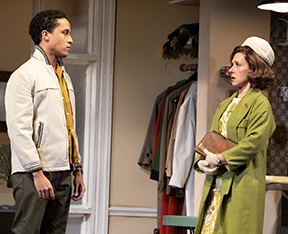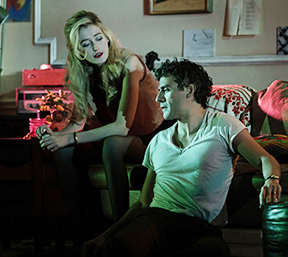By Lucy Komisar
This play is proof that Lorraine Hansberry had several lives, not just that of a black woman telling a civil rights story in her famous “A Raisin in the Sun,” but also a Greenwich Village bohemian among arty people, in this script an actress and wife of a would-be folk café impresario whose friends and neighbors include a playwright, painter, and a bookstore staffer.
Hansberry’s political antenna made her quite cognizant of the local politics, and she would have written this play in the early 60s, when I, a Villager, was engaged in the political conflict that is her backdrop. And she throws in race, religion and gender issues which were a lot rarer 60 years ago than today.

Sidney Brustein (the funny Oscar Isaac), in his late 30s, fails at a series of endeavors. Lately, he bought a folk song night club that didn’t do well. His wife Iris (Rachel Brosnahan, good as the pre-feminist woman) reminds him that there’s a bunch of them within few blocks (around MacDougal and Bleecker Streets). That was the Village. He has just bought a weekly paper. If that’s the Village, it is The Voice.
There’s a political fight going on inside the local Democratic party. That would be modeled on the reformers battle (led by Eleanor Roosevelt) against the corrupt Carmine DeSapio, who started as a Democratic district leader in Greenwich Village, became the boss of the machine called Tammany Hall, was connected to the Mob, was ousted from party power in 1961 and would go to prison for bribery and extortion. The good guy who beat him was Ed Koch of the Village Independent Democrats. I was a member and worked for Koch.
The other New York City reality is that the apartment is cluttered, with cheap furniture, and there are three locks on the front door!
We don’t see a wonderful marriage. Iris is an actress, 29, and has insecurities that have put her in analysis. Sidney puts her down, says she won’t show up for an audition. She is resentful. She points to Sidney’s drinking.” She thought Jews didn’t drink. He ripostes, “I’m assimilated.”
A lawyer friend Wally O’Hara (Andy Grotelueschen as a believable pol) wants the weekly’s support in his insurgent’s race in the local primary. He pledges good government, to get control of a center that is a big narcotics drop. Sidney demurs, doesn’t want to get involved. But he should care about Willie Johnson, 15, who swept the floor at the night club and overdosed.
The eponymous sign that goes up in the window says “Wipe out Bossism, Vote O’Hara for Reform.” I enjoyed the street sounds of political marchers singing “The Internationale.” Actually, the VID was never that left!
Moving into some ever-current issues, Iris’ sister Gloria (well played by Gus Birney), 26, is a call girl presenting herself as a high fashion model. She got into the life as a naïve kid and is desperate to get out.
Alton (Julian De Niro) who works in a bookstore and happens to be black, will become enamored of the white Gloria and ask to marry her. He is the only black in the play.
And David (Glenn Fitzgerald), the playwright, is gay. He explores his inner cruelty when he asks Gloria to come to his apartment and watch him with a guy.
Then more bad reality shows up. Alton is outraged when he learns about Gloria. “Is it true she’s a hooker? Why didn’t you tell me?”
He said his father was railroad porter for 30 years, his mother a domestic who would bring home leftover food and clothes. “He just knocked it all on the floor…I ain’t going to have the white man’s leavings in my house, no mo’!”
And Alton says, I don’t want white man’s leavings, Sidney. Not now. Not ever.” Which raises the point why a call girl is anyone’s leavings. Indeed Hansberry makes it clear that Gloria is a victim.

But back to racism resplendent, the third sister, Mavis (a fine Miriam Silverman), thinks that being black is of a lower order than being a call girl. Still, in the play’s twisty turns, there’s a surprise coming about her own home life.
There’s a clear feminist line in the play. None of the three sisters have been treated well by men. Most of the men in the story are not admirable.
Iris gets it right when she says, “This world is so dirty.” Which takes us back to Wally, whose “win” was managed. What would the new editor do? Well, The Voice put up a good fight until the founders Ed Fancher, Dan Wolf, and Norman Mailer sold out for what then was big bucks to NYC Councilman Carter Burden. So, a politician took over. But this was after Hansberry’s play.
This play is not as brilliant as “Raisin,” it’s as cluttered as the apartment, but the themes are prescient, the actors playing Sidney and the three sisters are very good, Anne Kauffman’s direction is lively. It’s a fine theatrical event.
“The Sign in Sidney Brustein’s Window.” Written by Lorraine Hansberry, directed by Anne Kauffman. The James Earl Jones Theater, 138 West 48th Street, NYC. 212-239-6200 or 800-447-7400. Runtime 2h:40m. Opened April 27, 2023; closes July 2, 2023. Review on NY Theatre Wire.



